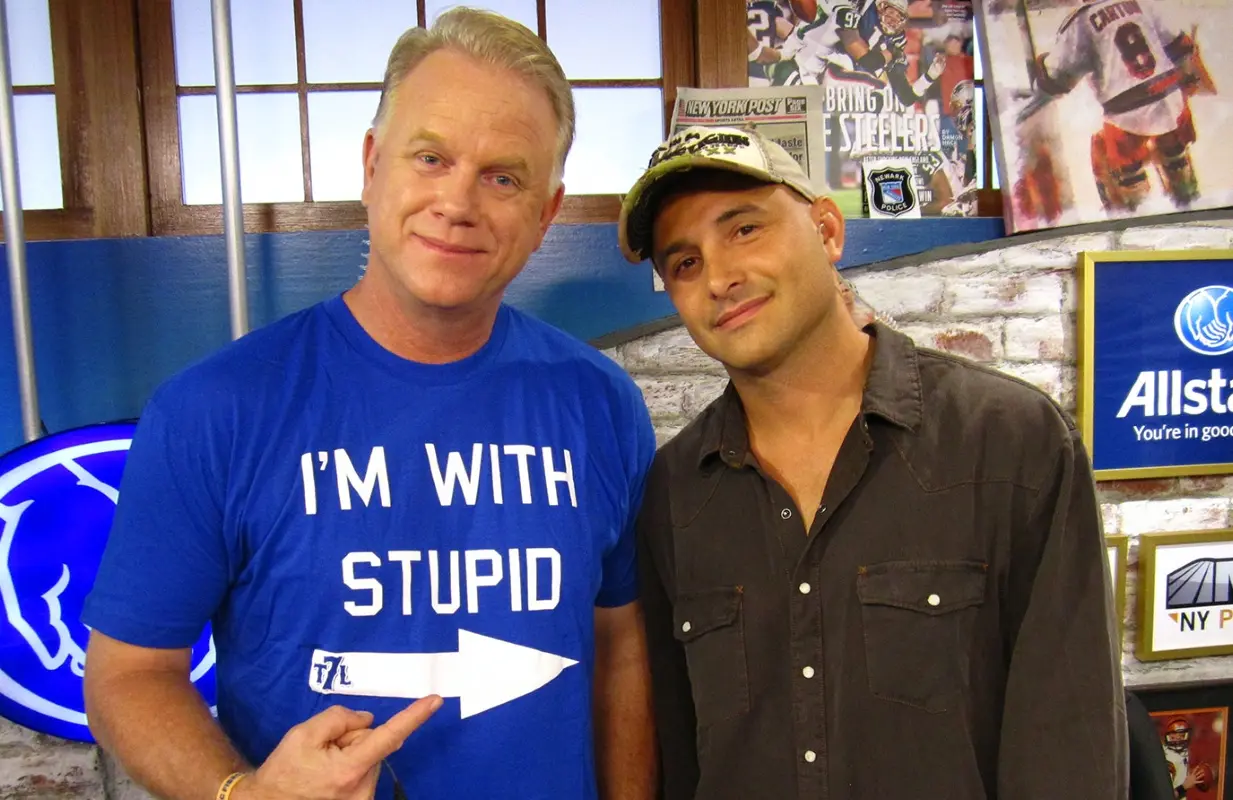Like Its Subject, HBO's Wild Card Is a Double-Dealer
-
 Craig Carton (left), with his former New York morning radio show co-host Boomer Esiason. (Photo: HBO)
Craig Carton (left), with his former New York morning radio show co-host Boomer Esiason. (Photo: HBO)The editor-in-chief of the daily newsletter Best Evidence, Sarah D. Bunting knows a thing or two about true crime. Her weekly column here on Primetimer is dedicated to all things true-crime TV.
For years, I kept the bedroom clock radio tuned to New York's WFAN for my morning-alarm needs, because nothing could eject me from bed as effectively as the wakeful jolt of irritation caused by the Boomer & Carton show. Boomer Esiason and Craig Carton's brand of morning-zoo sports talk was never my thing, but more specifically I found Carton — like a swarm of fratty bees all complaining about the Jets coaching staff — physically unpleasant to listen to.
So, when the immensely popular radio show stopped production shortly after Carton's arrest on federal fraud charges, my first thought was that I'd need to find another annoying setting on the AM dial, but I also remember thinking that the eventual 30 For 30 episode on Carton's downfall would make for great viewing — not least for the schadenfreude so many non-fans like myself would enjoy while watching it.
I'm sorry to report that Wild Card: The Downfall of a Radio Loudmouth isn't that. The film is an HBO Sports production, not an ESPN one, which is fine. What isn't fine is that it's directed and produced by Martin Dunn and Marie McGovern, who are friends of Carton's, and who don't disclose that fact. I don't require transcript-style objectivity from documentaries; in fact, some of the best true-crime non-fiction films are deeply personal — films like Strong Island and Dear Zachary that aim to investigate and enlighten but also to protest and grieve. But Yance Ford and Kurt Kuenne incorporated their connections to their subjects into their work, whereas Wild Card would have us believe Dunn and McGovern just read Nick Paumgarten's 2019 New Yorker profile of Carton and his downfall and decided to follow up with a film when he was released from prison.
The film wastes no time in centering Carton as its narrator, and not only is he an unreliable one, but it becomes clear not long into Wild Card that whatever the film's directors might have seen as its narrative arc, Carton's aim is to rehabilitate his image, perform change and recovery, and get his ass back behind a microphone. (As of this writing, local news outlets seem sure he'll succeed.) And that's not a cardinal sin; Carton makes a point of saying that he's really only good at one thing, and that's sports-talk radio. My issue is with Wild Card's determination to make Carton a pitiable figure, a man whose emotional development was so stunted by childhood sexual abuse that his ruin was an inevitable tragedy.
You could argue that that abuse led Carton indirectly to certain self-destructive decision-making processes, and you could argue that an untreated gambling addiction took him over. Wild Card argues both. What Wild Card doesn't do is reckon with Carton's actual crimes, or even explain them to the audience; instead, it's content to remain vague on workings of Carton's VIP-ticket Ponzi set-up, and to leave out the fact that he falsified documents.
The film also gives Carton a free pass for his toxic on-air brand, which made him an inherently unlikable character to many. Not giving the project to a director who would push back a little on his "misunderstood shy kid" spin was a mistake. Instead we get a litany of talking-head interviews (including one with Chris Christie, who provides reasonably interesting comments but comes with some credibility baggage of his own), talking about Carton's "act" and how selflessly he gives of his time to charities, and how great he is with his kids. That's interspersed with entries from Carton's prison journal, which seem totally calculated, like a kid droning through an assigned book report on how cheating is bad. Paumgarten's New Yorker article, often cited here word for word, is much better at giving Carton and his situation more dimension than the assisted autobiography and budget casino-chips B-roll in Wild Card.
Wild Card isn't all bad. The story at its center is interesting, Carton does have charisma, and at an hour and 16 minutes, it's a manageable length. But at its core it's dishonest and manipulative, coming off more like a combination résumé builder and amends-making video than it does a documentary. I recommend reading the New Yorker article instead, and waiting to see if 30 For 30 decides to take a run at the subject.
Wild Card: The Downfall of a Radio Loudmouth airs on HBO October 7 at 9:00 PM ET.
Sarah D. Bunting co-founded Television Without Pity, and her work has appeared in Glamour and New York, and on MSNBC, NPR's Monkey See blog, MLB.com, and Yahoo!. Find her at her true-crime newsletter, Best Evidence, and on TV podcasts Extra Hot Great and Again With This.
TOPICS: Wild Card: The Downfall of a Radio Loudmouth, HBO, Boomer Esiason, Craig Carton, True Crime